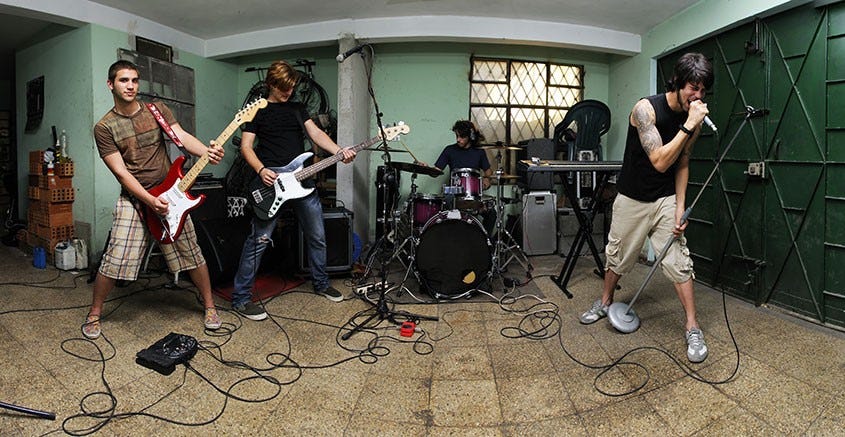The generation gaps in music have always existed. Every parent hears what their children are listening to, and they sometimes condemn it as garbage - saying, "Their generation's music was much better".
My parents were weekend musicians. They understood popular music. Before I started playing the guitar, I knew nothing about music. I knew what I liked and didn't like. It was the early 1970's, and all we really had were AM radios. We listened to the radio in the station wagon, we listened to the radio outside while we did yard work, and we listened to our pocket radios when we went to bed. In many ways, music of the previous generations seemed to have more "crossover tolerance" than generational music of today.
When you think of the bands from the 1950's, it was all very pop-Americana harmonies that was pleasing to the listener. Remnants of swing jazz and blues were also considered part of popular music. Then in the early 1960's, the Beatles and the Rolling Stones came along and changed everything. This was one of the very first music generational gaps that existed between parents and their children. By the middle to late 1960's, rebellious, anti-war music widened the gap even further. As a result, the biggest musical event in history took place in the summer of 1969 in Woodstock, New York.
Music changed literally by the decade. The 1970's began the era of heavier, progressive rock music. Bands like Yes, Genesis, E.L.P, Jethro Tull and King Crimson gave way to strange time signatures, long episodic ballads that took up entire album sides. Though they were not yet referred to as classic rock legends, bands like Led Zeppelin, Pink Floyd, Lynyrd Skynyrd, Aerosmith, Boston, The Eagles, Chicago, Heart, Journey, Kansas, Queen, Rush, REO Speedwagon, Supertramp and Van Halen all became foundation staples in 70's classic rock music. The singer-songwriter movement availed to calm the raging waters. Disco swept the country, and rock crossed over to jazz to form something called fusion.
By the 1980's, punk rock grew in popularity along with another new form of music called New Wave. The early part of the 1980's gave way to sweeping electronic keyboards and synthesizers, cannon snares and electronic drums. Big hair, power rock guitars and glamorous outfits became the latest trend. This generational gap in music was clearly defined once again. Many bands from the 1960's and 1970's did their combined best to remain relevant during this decade, but would slowly and eventually fade away.
The 1990's became the "grunge" generation. Suddenly, it was uncool to know more than three chords on your guitar. Nirvana opened the door for a new form of rock music that was based on anger and frustration. It dug deeper into the behavior of the disdaining, self-loathing narcissist of a new generation. If you went to a grunge concert, you needed to be prepared to get beat up if you got too close to a mosh pit. On the other side of this generation were the "Lilith" girls. The dream pop, shoe gaze, and indie pop music of female artists like Sarah McLachlan, Tori Amos, Shawn Colvin, Alanis Morissette, and many others who became the voices for women everywhere.
The music from every new generation replaced the old music from the previous generation. If you are/were a music lover like me, you kept what you liked and discarded what you didn't like. Having been born in the early 1960's, I was exposed to all of these generations of music. I was extremely lucky in that sense. My personal music catalogue has reached into the tens of thousands of songs. These are the songs that have become the soundtracks to my life. Every generation has their own soundtrack. This was understood for several decades. Every decade from the 1950's to the 1990's had music that was created and recorded by artists that were both singer-songwriters and bands.
Then in the 2000's, something changed.
What is missing in today's music that existed in the music we grew up with? Which element no longer exists in today's music - that has changed the way music is appreciated and consumed very differently from the music of yesteryear?
Watch this episode from Rock Beato to learn more.
My comments to this video:
"It really sucks hard that this is the reality of music now. As a guitar teacher, it has long since become an exercise in futility to try to get my younger students to "pound the pavement" and try to find other kids to jam or collaborate with. There is literally no interest whatsoever in putting a band together. Why? Because there are no bands for them to aspire to. There are some incredible young musicians out there - real musicians - and they get almost no recognition because, instead of maintaining the illusion of an audience on social media, they choose to practice their instruments eight-hours a day. This younger generation has no idea what they are missing. As difficult as it was back in the day to try to put a band together, and keep it together longer than a year or two, it is impossible now."
If you would like to support my work, please consider a premium subscription that gives you all-access to everything on SoundHole (for just $5 per month or $50 per year):
Or you can send a one-time gift by buying me a $5.00 coffee, or two or three or...
Thank-you for your loyalty and support,
Dave





